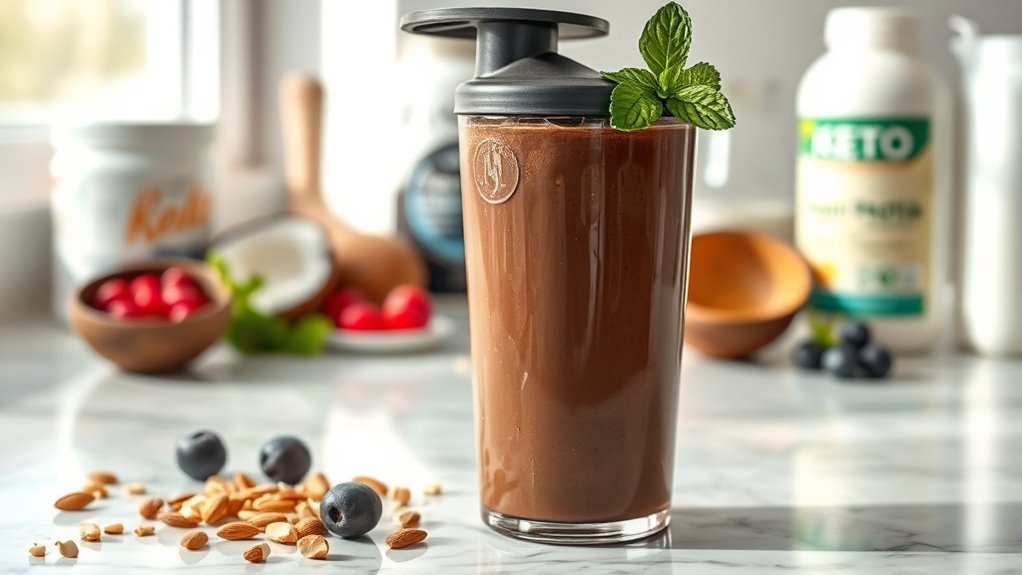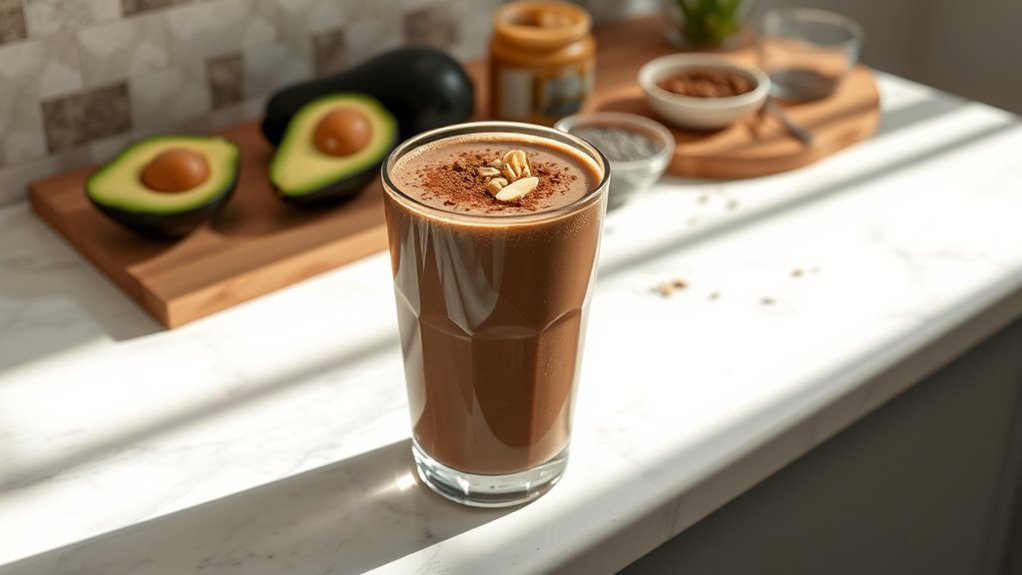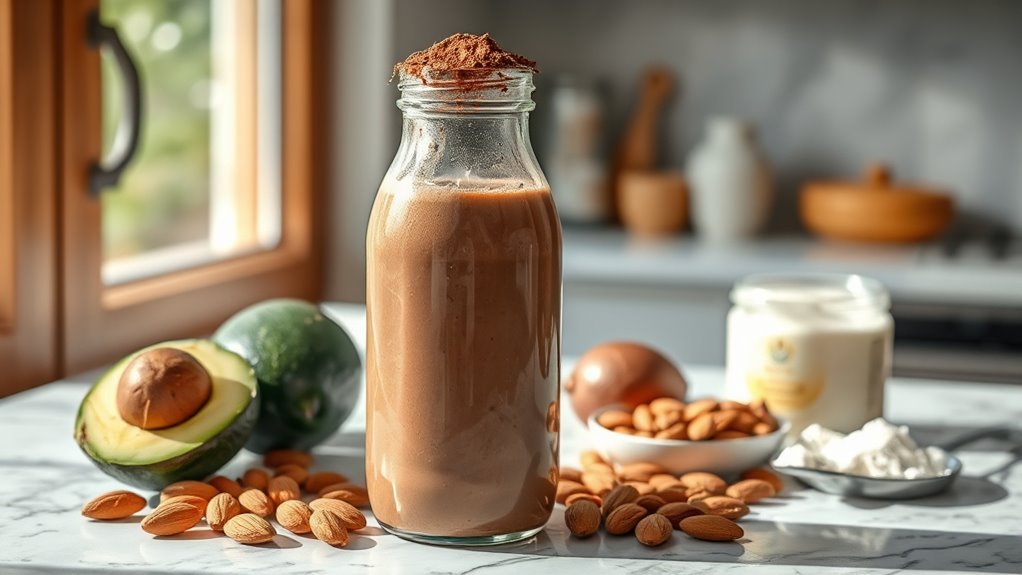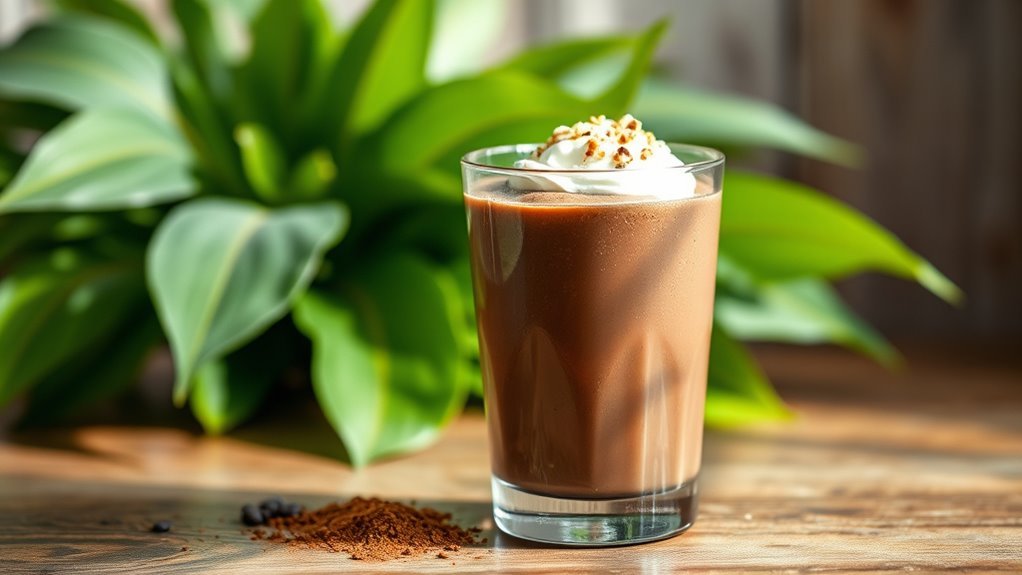For keto-friendly protein shakes, focus on low-carb sources like whey, casein, or plant-based proteins. Select options with no added sugars or high-carb ingredients, and consider brands like Isopure and Quest Nutrition. Incorporating healthy fats like coconut oil or nut butter can enhance flavor and promote satiety while keeping you in ketosis. Watch your protein intake to avoid gluconeogenesis. Discover more about sweeteners to choose and creative recipes to fit your keto lifestyle.
Understanding Keto-Friendly Protein Sources

When you’re following a ketogenic diet, understanding which protein sources fit your nutritional needs is vital. The right proteins can provide significant keto protein benefits, including muscle maintenance and satiety, helping you stay on track. Opt for high-quality sources like grass-fed beef, wild-caught fish, and eggs, as they offer ideal amino acid profiles. Keep in mind protein absorption factors, such as digestion speed and nutrient synergy. For instance, combining protein with healthy fats can enhance absorption while keeping you in ketosis. It’s important to balance your protein intake, as excessive amounts can lead to gluconeogenesis, potentially disrupting your state of ketosis. By selecting keto-friendly protein sources, you empower your dietary freedom while supporting your overall health goals. Additionally, incorporating low-carb protein powders can provide a convenient way to meet your protein needs without compromising your ketogenic goals.
Key Ingredients to Look For

When choosing a keto-friendly protein shake, it’s important to pay attention to certain key ingredients. Look for low-carb protein sources, healthy fats, and sugar-free sweeteners to make certain your shake aligns with your dietary goals. These components not only support ketosis but also help maintain a balanced nutritional profile.
Low-Carb Protein Sources
Although many protein sources are available, not all are suitable for a keto-friendly diet due to their carbohydrate content. When selecting low-carb protein sources, focus on animal-based proteins like whey and casein, which offer high protein absorption rates and support ideal protein digestion. If you prefer plant-based proteins, look for options like pea protein or hemp protein, ensuring they’re low in carbs. When considering protein supplements or bars, check the labels for carbohydrate content and added sugars. Timing your protein intake is essential; aim for balanced meals or snacks that fit within your daily carb limits. It’s also important to monitor protein intake to stay within target ranges and optimize results while exploring various protein recipes to keep things interesting while staying within your keto goals.
Healthy Fats Inclusion
Incorporating healthy fats into your keto-friendly protein shakes is essential for maximizing their nutritional benefits and supporting your overall dietary goals. These fats not only enhance flavor but also help you feel satisfied and energized throughout the day. Here are some key ingredients to evaluate:
- Avocado benefits: Creamy and nutrient-dense, avocados provide healthy monounsaturated fats.
- Nut butter options: Almond or peanut butter adds protein and a rich texture.
- Coconut oil: This fat source boosts ketone production and provides energy.
- Cheese varieties: Cream cheese or cottage cheese can add creaminess and flavor.
- Flaxseed benefits: Rich in omega-3s, flaxseeds offer fiber and additional health perks.
Additionally, consider using ingredients that are low in carbohydrates to stay aligned with ketogenic diet principles for optimal results. Integrate these ingredients into your keto smoothies for delicious, satisfying results!
Sugar-Free Sweeteners
To maintain a delicious flavor profile in your keto-friendly protein shakes without compromising your carbohydrate intake, selecting the right sugar-free sweeteners is essential. Natural sweeteners like stevia and erythritol are popular choices, as they provide sweetness without affecting your blood sugar levels. They’re derived from plants and have minimal calories, making them ideal for a keto diet. On the other hand, some artificial sweeteners, such as aspartame and sucralose, can be effective but may come with concerns regarding long-term health effects. It’s vital to read labels and choose options that suit your personal preferences and dietary needs. Ultimately, balancing taste and health is key, empowering you to enjoy your shakes guilt-free while staying within your carb limits. Additionally, be aware that artificial sweeteners may impact gut health and trigger cravings, so moderation is essential.
Top Low-Carb Protein Shake Brands

When it comes to low-carb protein shakes, choosing the right brand can make all the difference in maintaining your keto lifestyle. You’ll want to explore the top low carb protein shake brands that offer a variety of popular protein flavors to suit your taste buds. Here are some standout options:
- Isopure: Known for its purity and zero carbs.
- Quest Nutrition: Offers delicious flavors without the guilt.
- Orgain: Plant-based options for a clean, nutritious shake.
- Keto Logic: Specifically designed for keto enthusiasts.
- Bone Broth Protein: Rich in collagen and low in carbs.
Additionally, incorporating keto-friendly options into your diet can enhance your overall nutrition while enjoying tasty shakes. Selecting the right shake guarantees you stay on track and enjoy your journey to freedom in your dietary choices.
The Role of Fats in Keto Protein Shakes
When crafting your keto protein shakes, incorporating healthy fats is essential for achieving the right balance of macronutrients. You’ll want to evaluate ideal fat ratios to support ketosis while enhancing flavor and texture. By choosing the right fat sources, you can make your shakes more satisfying and enjoyable. Additionally, healthy fats from sources like whole milk can contribute to balanced caloric content while promoting satiety throughout the day.
Healthy Fat Sources
Incorporating healthy fat sources into your keto protein shakes is essential for maintaining the diet’s low-carb, high-fat balance. These fats not only enhance the flavor but also provide sustained energy and satiety. Here are some fantastic options to contemplate:
- Avocado oil for a creamy texture and heart-healthy benefits
- Coconut cream for a rich, tropical taste
- Nut butters, like almond or peanut, for added protein and healthy fats
- Chia seeds, which are packed with fiber and omega-3s
- MCT oil for quick energy and improved mental clarity. Additionally, using nutrient-dense food options can help ensure you meet your dietary needs while enjoying your shakes.
Optimal Fat Ratios
Understanding the ideal fat ratios in your keto protein shakes is essential for maximizing their benefits and ensuring you stay in ketosis. You should aim for a fat composition that consists of approximately 70-80% of your shake’s calories from fats. This prime fat ratio helps your body efficiently utilize fat for energy instead of carbohydrates. Incorporating prime fat types, such as MCT oil, avocado, or coconut oil, can enhance ketone production, keeping you fueled throughout the day. Additionally, balancing these fats with a moderate protein intake—around 15-25% of total calories—ensures you maintain muscle mass while promoting fat loss. By focusing on these ratios, you’ll create a satisfying shake that aligns with your keto lifestyle and supports your health goals. Remember that monitoring overall carb intake is crucial for sustaining ketosis while enjoying protein shakes like Premier Protein.
Flavor Enhancements With Fats
Fat isn’t just essential for maintaining ketosis; it also plays a significant role in enhancing the flavor of your keto protein shakes. By incorporating various fat combinations, you can create rich and satisfying flavor profiles that make your shakes enjoyable.
Consider these delicious enhancements:
- Creamy coconut milk for a tropical twist
- Nut butters for a nutty richness
- Avocado for added creaminess and nutrients
- MCT oil for a smooth texture and energy boost
- Heavy cream for a luxurious, dessert-like experience
These fats not only elevate taste but also keep you feeling full longer, giving you the freedom to enjoy your meals without compromising your keto goals. Embrace the flavor and satisfaction fats can bring to your shakes! Additionally, healthy fats are crucial for promoting overall health while supporting your body’s energy needs during ketosis.
Homemade Keto Protein Shake Recipes
Creating your own homemade keto protein shakes is a delicious and convenient way to meet your nutritional needs while sticking to a low-carb lifestyle. You can experiment with various flavor combinations to keep things exciting. For instance, try blending unsweetened cocoa powder with almond milk and a scoop of your favorite keto protein powder for a rich chocolate shake. If you prefer fruity flavors, mix spinach, avocado, and a few berries for a revitalizing green shake. Adjust the shake textures by playing with the amount of ice or liquid you add. Incorporating healthy fats like coconut oil or nut butter can enhance both flavor and creaminess, ensuring your shakes are not only satisfying but also aligned with your keto goals. Additionally, including healthy fats like peanut butter can help you stay in ketosis while adding a delicious taste to your shakes.
The Importance of Protein Quality
When choosing a protein source for your keto-friendly shakes, it’s vital to take into account both the type of protein and its amino acid profile. High-quality proteins, like whey or collagen, provide essential amino acids that support muscle repair and overall health. Understanding these factors can help you make more informed choices that align with your dietary goals.
Types of Protein Sources
Choosing the right protein source is essential for maximizing the benefits of your keto-friendly protein shakes. You want to guarantee that you’re fueling your body with high-quality ingredients. Here’s a quick look at some popular protein sources:
- Whey isolate: Fast-absorbing, great for muscle recovery.
- Plant-based options: Ideal for those seeking dairy alternatives.
- Casein: Slow-digesting, perfect for overnight muscle support.
- Egg protein: Nutrient-rich and versatile for various diets.
- Pea protein: A great choice for vegans, packed with amino acids.
Amino Acid Profiles
Understanding the amino acid profiles of your protein sources can greatly impact your health and fitness goals, especially on a keto diet. Aiming for complete protein sources guarantees you’re getting all essential amino acids your body needs for muscle repair and overall health. Unlike incomplete sources, which lack one or more essential amino acids, complete proteins, like whey or egg protein, provide a balanced profile that supports peak performance. This balance is vital when you’re cutting carbs and relying more on fats for energy. By prioritizing high-quality proteins, you’re not just fueling your body; you’re also enhancing recovery and maintaining muscle mass on your keto journey. Make informed choices for your protein shakes to align with your goals.
Sweeteners to Avoid
While it might seem tempting to sweeten your keto-friendly protein shakes, some sweeteners can undermine your dietary goals. It’s crucial to avoid certain sweeteners that may spike your insulin levels or contain hidden carbs. Here’s what to steer clear of:
- Sugar: A high-carb nightmare, it’s best avoided on keto.
- Agave Nectar: Often marketed as natural, it’s still high in fructose.
- Honey: While natural, it’s loaded with sugars.
- Aspartame: An artificial sweetener linked to various health concerns.
- Sucralose: Another artificial option that can disrupt gut health.
Opt for natural sweeteners like stevia or erythritol instead. They’ll keep your shakes tasty without derailing your keto journey, giving you the freedom to enjoy your diet without guilt.
Nutritional Comparison of Popular Protein Powders
When crafting a keto-friendly protein shake, the type of protein powder you select can greatly impact your nutrition. Whey protein isolate is a popular choice, offering high protein content and low carbohydrates, making it an excellent option for your keto goals. On the other hand, plant-based proteins like pea or hemp provide nutritional benefits too, but often contain more carbs.
It’s essential to take into account ingredient sourcing as well; organic options typically have fewer additives and pesticides, enhancing their overall quality. Egg white protein is another great choice with minimal carbs and high bioavailability. Ultimately, when comparing these powders, look for those that align with your nutritional needs while supporting your commitment to a keto lifestyle.
Tips for Incorporating Protein Shakes Into Your Diet
Incorporating protein shakes into your diet can be a seamless way to boost your protein intake without sacrificing your keto goals. Here are some tips to make the most of your shakes:
- Plan your meal timing to guarantee your shake complements your meals.
- Use high-quality, low-carb protein powders for best results.
- Experiment with different shake preparation methods, like blending with avocado or coconut milk for healthy fats.
- Keep ready-to-drink options on hand for convenience during busy days.
- Stay mindful of your overall macros to maintain balance.
Common Mistakes to Avoid With Keto Protein Shakes
Even though keto protein shakes can be a convenient way to meet your dietary needs, several common mistakes can undermine your goals. Avoiding these protein shake pitfalls is essential for success on your keto journey. Here are some common shake errors to watch out for:
| Mistake | Consequence | Solution |
|---|---|---|
| Using high-carb ingredients | Breaks ketosis | Stick to low-carb options |
| Skipping healthy fats | Reduces satiety | Add avocado or nut butter |
| Overloading on protein | Excess calories may hinder loss | Balance with fats and carbs |
| Not tracking macros | Can stall progress | Use an app to monitor intake |
Frequently Asked Questions
Can I Drink Protein Shakes During Intermittent Fasting?
Yes, you can drink protein shakes during intermittent fasting, but it depends on your goals. If you’re looking to maintain muscle while fasting, shakes with minimal carbs and calories—like whey or plant-based proteins—can be beneficial. However, if you’re strictly following a fasting protocol for metabolic benefits, it’s best to avoid anything that breaks your fast. Always consider your individual needs and how different protein types impact your fasting experience.
How Many Protein Shakes Can I Have Daily on Keto?
You can typically have one to two protein shakes daily on keto, depending on your daily protein intake goals. While some might worry about relying too much on shakes, they can be a convenient way to meet your needs. Focus on low-carb protein shake types, like whey isolate or collagen, to keep your diet in check. Just remember to balance them with whole foods for a well-rounded nutritional approach. Enjoy the freedom of choice!
Are There Vegan Keto-Friendly Protein Shake Options?
Yes, there are vegan keto-friendly protein shake options! You can look for shakes that use vegan protein sources like pea, hemp, or brown rice protein. Just guarantee they contain keto ingredients, avoiding added sugars and high-carb fillers. Many brands offer low-carb vegan protein powders that blend well with unsweetened almond milk or coconut milk. This way, you can enjoy a nutritious shake while sticking to your keto lifestyle without compromising your dietary choices.
What’s the Best Time to Consume Protein Shakes on Keto?
The best time to consume protein shakes on keto is right after your workout. Research suggests that about 20-25 grams of protein post-workout can enhance recovery and muscle synthesis. This is essential since ideal workout timing maximizes your results. By fueling your body with a shake after exercising, you’re not just aiding post-workout recovery but also ensuring you stay on track with your keto goals without sacrificing flexibility in your routine.
Can Protein Shakes Replace Meals on a Keto Diet?
Yes, protein shakes can occasionally replace meals on a keto diet, but it’s important to choose the right ones. Look for shakes with high-quality protein sources and low carbs to stay in ketosis. While they’re convenient, relying solely on shakes might lead to nutrient deficiencies. Balance your diet with whole foods like meats, dairy, and veggies to guarantee you’re getting essential vitamins and minerals alongside your protein intake.
References
- https://www.healthline.com/nutrition/keto-protein-powder
- https://www.medicalnewstoday.com/articles/keto-diet-protein-shakes
- https://www.ncbi.nlm.nih.gov/pmc/articles/PMC7077161/
- https://www.dietitiansofcanada.ca/Your-Health/Nutrition-Articles/Keto-Diet
- https://www.webmd.com/diet/what-is-the-keto-diet
- https://www.hsph.harvard.edu/nutritionsource/keto-diet/
- https://www.verywellfit.com/keto-friendly-protein-powders-5180286


